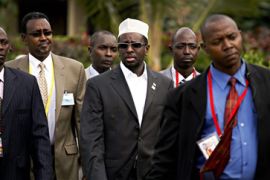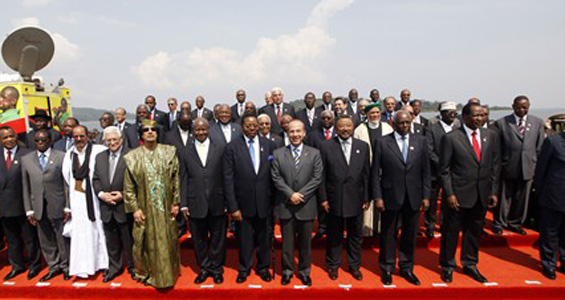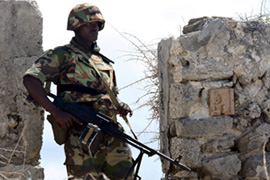Somalia dominates AU summit
But will interventionist rhetoric translate into a new approach to an old conflict?

 |
| Somalia has dominated the 15th African Union summit in Uganda [AFP] |
African leaders attending the 15th African Union (AU) summit in Kampala, the Ugandan capital, originally planned to focus on the health of African mothers and infants.
But al-Shabab’s July 11 attacks in Kampala and the challenges that the Somalia conflict pose for the region have now overshadowed that, shifting the summit’s focus to regional and world security.
If rhetoric is anything to go by, spirits are high among African leaders. In speech after speech they have condemned the Kampala attacks and called for immediate action against al-Shabab. Indeed, African willingness to address the conflict in Somalia seems to be gaining momentum.
What is new?
But the Somalia issue is not new. The civil war began as early as 1978. Tens of thousands of Somalis have perished and more than half of the country’s population has been displaced.
External actors have tried to address the conflict in the past. In 1992, the US sent thousands of soldiers to save starving Somalis. Although Operation Restore Hope saved many from famine, it did not succeed in establishing durable peace or a functioning state in Somalia.
In 2006, the regional power, Ethiopia, invaded in order to depose the Union of Islamic Courts, a consortium of clan-based Sharia courts, and to install Somalia’s transitional government into power. After two years of brutal occupation, Ethiopia withdrew having neither successfully installed the government nor destroyed the Islamic Courts.
Moreover, the United Nations has authorised AU forces to help protect Somalia’s government institutions and leaders. The AMISOM forces, as they are known, have been fighting al-Shabab and other insurgent groups in Mogadishu, the Somali capital, since May 2009. Besides keeping the government from falling they too have not made any tangible progress.
| IN DEPTH | |||||||||||||||||||||||
|
Reports from Kampala suggest the consensus is leaning towards increasing the number of AU troops in Somalia and changing its mandate from one of peace ‘support’ to peace ‘enforcement’.
Increasing troop numbers would certainly assist the transitional government and the AMISOM forces already present by helping to deny sanctuary to the insurgents and limiting their access to some of the more strategic parts of Mogadishu.
But, there are two challenges hindering efforts to recruit more AU troops for the Somalia mission.
Firstly, there is a lack of will among some of Africa’s most powerful countries. South Africa, Nigeria and Egypt are all reluctant to commit troops to Somalia.
There is also a widely accepted understanding among stakeholders that if troops from Ethiopia go back into Somalia, insurgents will benefit from popular Somali resentment against the Ethiopian state. The US and other donors have therefore urged Ethiopia to stay out and the Ethiopian leadership has provided a public assurance that it understands the sensitivities such actions may generate and pledged not to re-intervene militarily in Somalia.
Secondly, while other countries, like Guinea and Djibouti may carry the burden of sending their troops to Somalia, these countries cannot generate the numbers needed.
Coordinating such forces and attaining the necessary resources to fund them also presents a huge challenge. The commitment of donor countries to fund the peacemaking operation has so far proven to be insufficient – Uganda’s pledge to send 20,000 soldiers has been on the table for some time but donors have not yet acted to fund this project.
Changing mandate or rules of engagement
But, even if more troops were to be sent, there is little they can do under their current mandate. The AMISOM is currently tasked with defending government institutions and leaders. It can respond only when it comes under attack and this restriction has had a devastating impact on Somali civilians.
When insurgent forces attack AMISOM positions from Bakarah market, the largest open-air market in Somalia, or from other civilian neighbourhoods, the AMISOM troops indiscriminately shell those areas, thus harming civilian populations.
Ironically, to date, the AMISOM has not attacked the insurgents’ bases, even though it knows where they are, because their mandate does not allow them to attack. This puts both the Somali government and the AMISOM forces in an untenable position.
Changing the AMISOM mandate from peace support to peacemaking may have mitigated this problem in the short term. But, because of reservations by some donor countries, the AU has chosen not to change the mandate but to allow for the modification of the AMISOM’s rules of engagement. This means that AMISOM troops can now conduct pre-emptive attacks against insurgents.
UN endorsement
 |
| Some of Africa’s most powerful countries are reluctant to send troops to Somalia [EPA] |
Although the Somali government or regional and sub-regional organisations can provide legal cover for the peacemaking mission, the troop-contributing countries will likely prefer to go through the UN Security Council.
They would do this not because article 53 of the UN charter prevents regional organisations from acting unilaterally, but because they need to secure the political and financial support of the international organisation and powerful governments, as well as the legitimacy that comes with a UN endorsement.
As regional organisations generally have a proven track record of stabilising conflict zones, the Security Council is likely to allow the AU to increase the number of AMISOM troops and to change its mandate, or alternatively to modify its rules of engagement.
But whether such an endorsement, if it materialises, will translate into the genuine support of the five permanent members of the Security Council or even into US financial and political support remains to be seen.
Lessons from history
However, caution is needed as history teaches us that external forces cannot permanently defeat insurgents.
By way of comparison, the international community has realised that in order to defeat insurgents in Afghanistan, more than 300,000 Afghan forces will have to be recruited and trained in the next three years.
According to Hamid Karzai, Afghanistan’s president, the plan is that by 2013 Afghan forces will take over the security of the country. The US has also pressured Afghanistan’s leadership to make progress in the areas of governance and development.
But African leaders have neither presented a plan to train Somali security forces nor a strategy to address the country’s development challenges. This is a major short-coming of the AU summit for no matter how large or well-trained and equipped, foreign forces can never replace Somali security forces.
Moreover, although the international community has been pressuring the Somali government to make progress in governance, the transitional government has been notoriously slow in doing so.
African Union progress
In short, the AU has come a long way. Analysts used to call the former Organisation of African Unity the “dictators club”.
But, things are changing. The AU is trying to address several African problems at the same time and many African countries have also inched towards democracy.
We must now hope that the AU’s efforts to end the conflict in Somalia this time will be different and that its military involvement in the country will be short, even-handed and comprehensive – that is that it must include a plan to prepare a large, inclusive, disciplined and professional Somali force.
Most importantly, increasing the number of troops or changing the rules of engagement should not be understood as giving the AMISOM a license to harm civilians. The AU forces must observe their ‘responsibility to protect’ the civilian population as there can be no justification for atrocities committed against innocent people.
Dr Afyare Abdi Elmi is a professor of International Affairs at Qatar University and the author of Understanding the Somalia Conflagration.
The views expressed in this article are the author’s own and do not necessarily reflect Al Jazeera’s editorial policy.
